| Srl | Item |
| 1 |
ID:
141952
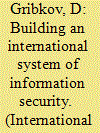

|
|
|
|
|
| Summary/Abstract |
INFORMATION SECURITY is one of the top issues on today's global agenda. Awareness of growing threats in information space and of their potential effects prompts the need for a systemic search for solutions to information security problems.
|
|
|
|
|
|
|
|
|
|
|
|
|
|
|
|
| 2 |
ID:
161068
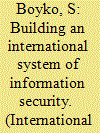

|
|
|
|
|
| Summary/Abstract |
THE BASIC PRINCIPLES for the State Policy of the Russian Federation in the field of International Information Security for the Period until 2020, which were approved by the Russian president on July 24, 2013,1 t clearly state the objective of Russia's policy on international information security - to help develop an international legal regime to underlie such a system.
|
|
|
|
|
|
|
|
|
|
|
|
|
|
|
|
| 3 |
ID:
122351
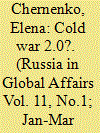

|
|
|
|
|
| Publication |
2013.
|
| Summary/Abstract |
It is very hard - in most cases impossible - to track down the source of a cyber attack. Since the U.S. and Russia have reserved the right to respond to cyber incidents like they were conventional acts of aggression, the two countries must work out confidence-building measures.
|
|
|
|
|
|
|
|
|
|
|
|
|
|
|
|
| 4 |
ID:
140582
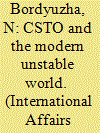

|
|
|
| 5 |
ID:
191038
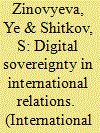

|
|
|
|
|
| Summary/Abstract |
IN THE global digital transformation age, the principle of state sovereignty has acquired an extra, digital dimension. Digital sovereignty, which in the broadest sense means the independence of a country in its digital domestic and foreign policy, is becoming a key criterion for measuring a country's viability, security, and economic status. To better understand the nature of digital sovereignty, it is essential to fully understand the concept of state sovereignty in general.
STUDIES of sovereignty date back to French jurist and philosopher Jean Bodin's 1576 book Six Books of the Commonwealth that defined sovereignty as the supreme, absolute power that a monarch had over his subjects as God's representative on Earth. At first, state sovereignty meant control of a specific territory. Hugo Grotius, Thomas Hobbes, and John Locke were founders of key theories of sovereignty in political science and jurisprudence..
|
|
|
|
|
|
|
|
|
|
|
|
|
|
|
|
| 6 |
ID:
165634


|
|
|
|
|
| Summary/Abstract |
BECAUSE of the suspension until 2009 of the meetings of the United Nations Group of Governmental Experts on Developments in the Field of Information and Telecommunications in the Context of International Security (GGE), more work on information security began to be done at regional level, primarily by the Shanghai Cooperation Organization (SCO).
|
|
|
|
|
|
|
|
|
|
|
|
|
|
|
|
| 7 |
ID:
159288


|
|
|
|
|
| Summary/Abstract |
MUCH of what is said and written about international information security amounts to alarmist predictions that the use of high technology to destabilize the current world order will continue to grow in scale. With all respect for those who make such predictions, it has to be admitted that it's too late to start getting anxious - what they are foretelling has already happened. Cybersecurity issues are dealt with on the front pages of newspapers and the homepages of websites, and are high on agendas for relations between countries.
|
|
|
|
|
|
|
|
|
|
|
|
|
|
|
|
| 8 |
ID:
138054
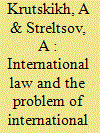

|
|
|
|
|
| Summary/Abstract |
THE IMPACT of information and communication technologies (ICT) on all aspects of human life, society and the State cannot be overemphasized. Apart from the obvious benefits in terms of economic, social and cultural development, the enhancement of the role of ICT in the contemporary world inevitably brings new risks for international and national security. There is already real evidence that the damage from the use of ICT for purposes contrary to the Charter of the United Nations, as well as for criminal and terrorist purposes may be comparable to the most destructive weapons. The list of potential targets for information weapon attacks includes not only the information resources of the Internet, but also the critical infrastructures of States in the industry, transport and energy sectors. What's more, the scale and technological level of such destructive impact are steadily increasing.
|
|
|
|
|
|
|
|
|
|
|
|
|
|
|
|
| 9 |
ID:
180705


|
|
|
|
|
| Summary/Abstract |
ON DECEMBER 28, 2019, the Russian president established a new division in the Foreign Ministry, the Department of International Information Security (DMIB). This showed special attention paid by the Russian leadership to the whole spectrum of issues brought into being by information and communication technologies (ICTs) and aimed to ensure prompt and effective diplomatic reactions to challenges and threats arising in information space.
|
|
|
|
|
|
|
|
|
|
|
|
|
|
|
|
| 10 |
ID:
138186
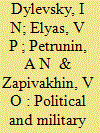

|
|
|
|
|
| Summary/Abstract |
The authors look at the political and military aspects of the Russian Federation's state policy on international information security and the guidelines to be followed to counter military and political threat of aggressive use of information and communication technologies.
|
|
|
|
|
|
|
|
|
|
|
|
|
|
|
|
| 11 |
ID:
093029


|
|
|
| 12 |
ID:
073181


|
|
|
| 13 |
ID:
158174


|
|
|
|
|
| Summary/Abstract |
THE POSSIBLE AGENDA for Russian-American cooperation in the field of international information security (IIS) is determined mainly by the current state of Russian-American relations and the growing role of the ongoing scientific and technical revolution in world politics in general.
|
|
|
|
|
|
|
|
|
|
|
|
|
|
|
|
| 14 |
ID:
181363


|
|
|
|
|
| Summary/Abstract |
ON April 12, 2021, Russian Presidential Decree No. 213 approved the Fundamentals of Russian State Policy in the Field of International Information Security
|
|
|
|
|
|
|
|
|
|
|
|
|
|
|
|
| 15 |
ID:
137326
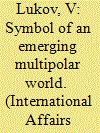

|
|
|
|
|
| Summary/Abstract |
ON JUNE 16, 2009, Yekaterinburg hosted the first meeting of the leaders of the BRIC nations, which laid the groundwork of a fundamentally new format for cooperation among countries.
For the first time, the major "new economies" formed an association to promote their common interests and the interests of a wide range of developing countries. Thus, from the very beginning, the BRIC member states positioned it not as a closed club to serve their own interests, but as a structure open for the outside world and acting in the interests of a wide range of states. The Yekaterinburg Statement emphasized that "the dialogue and cooperation of the BRIC countries is conducive not only to serving common interests of emerging market economies and developing countries, but also to building a harmonious world of lasting peace and common prosperity.
|
|
|
|
|
|
|
|
|
|
|
|
|
|
|
|
| 16 |
ID:
188491
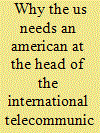

|
|
|
|
|
| Summary/Abstract |
INFORMATION and communication technologies (ICTs) are becoming key tools of international influence for nations. Geopolitical rivalry has largely shifted to the ICT realm. A nation's level of digitalization now ranks alongside its economic, political, and military strength as a determinant of its international status.
|
|
|
|
|
|
|
|
|
|
|
|
|
|
|
|